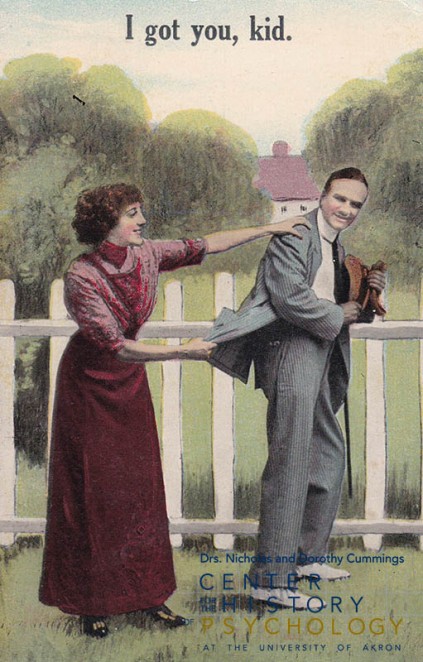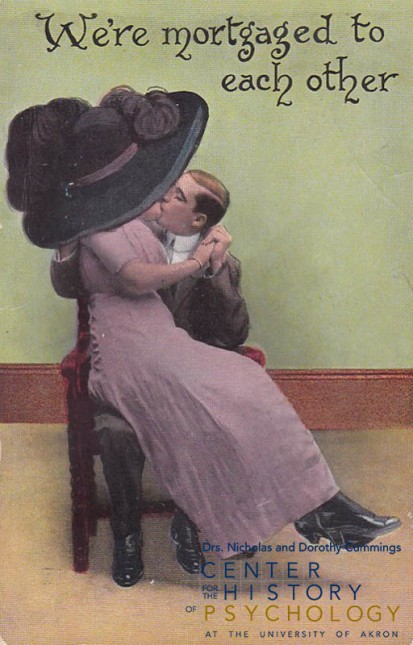By Randall Slonaker
In 2010, historian Lynn Dumenil published, The Modern Temper: American Culture and Society in the 1920s, wherein she posits that the growth of corporations, including the growth of consumerism, contributed to a sense of alienation amongst Americans living in the early twentieth century. Ironically, these same Americans used consumer products, including mass media and entertainment products in an attempt to alleviate stress and alienation, and to foster and maintain a sense of identity. The postcards in the binder entitled “Lovers Portraits Volume 1” seem to take part in this process of coping with cultural change.
Historian Jackson Lears posited similar theories in his 2009 work, Rebirth of a Nation: The Making of Modern America, 1877-1920. In fact, his book includes an image of a postcard from 1909 that illustrates the changing nature of gender roles and work in the early twentieth century. He mentions that increasing numbers of women began to work as secretaries and typists — jobs that had until recently been the domain of young men. The postcard shows a man with a smiling woman facing him while sitting on his lap, with a caption reading, “I love my wife, but OH! You kid.” Lears uses this postcard as an example of how the trope of the flirtatious, pretty young office worker who tempted married men became very common in the early twentieth century.
Although Lears’ work does not mention this fact, the phrase, “I love my wife, but Oh! You Kid!” is the title of a groundbreaking, hit song from 1909, about a man who undertakes a sexual rendezvous with another woman when his wife leaves town. On June 6, 2014, National Public Radio aired a story about the now, mostly forgotten song that outraged the nation’s self-appointed guardians of morality at the time of its release. https://www.npr.org/2014/06/06/319539860/nobody-panic-its-only-a-pop-song-about-sex
A Google image search for postcards featuring this phrase leads to dozens of images, including a montage of nine postcards, linked to an article on slate.com about the controversial, 1909 pop music hit. http://www.slate.com/articles/arts/culturebox/2014/06/sex_and_pop_the_forgotten_1909_hit_that_introduced_adultery_to_american.html
While the Lovers Portrait collection does not feature any cards with the phrase, “I love my wife, but Oh! You Kid!”, card # 245 in the LoversPortraitsV1 binder does feature an image of a smiling woman grabbing a man, her right hand on his shoulder, her left hand grabbing the tail of his suit coat, with the caption reading, “I got you, kid.” One wonders if this was yet another take on the phraseology contained in the hit song?

Card #094 in this same binder features a woman sitting on a man’s lap, but instead of perpetuating the trope of the flirtatious “office girl”, the caption is one that reinforces marital commitment and domesticity, reading, “We’re mortgaged to each other.”

Images like the above show that postcards could celebrate seemingly conventional married relationships as well as office romances. Mentioning the mortgage, however, makes clear that financial worries were never far off, despite the card’s levity.
The David P. Campbell Postcard Collection, searchable at postcard.uakron.edu, is a key collection of the CCHP’s Institute for Human Science and Culture. This blog series chronicles student efforts to make a select group of these postcards more accessible through an Unclass offered through the EXL Center and the English Department at the University of Akron.
